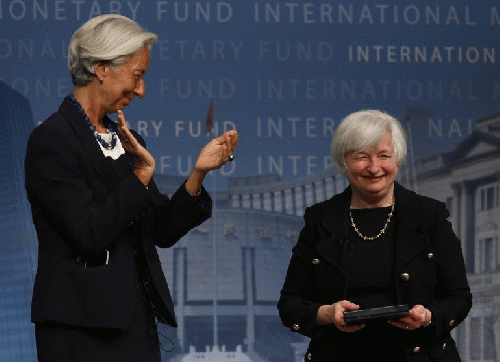One thing to be said for the women now heading the Federal Reserve and the IMF: compared to some of their predecessors, they are refreshingly honest. The Wall Street Journal reported on July 2nd:
Two of the world's most powerful women of finance sat down for a lengthy discussion Wednesday on the future of monetary policy in a post-crisis world: U.S. Federal Reserve Chairwoman Janet Yellen and International Monetary Fund Managing Director Christine Lagarde. Before a veritable who's-who in international economics packing the IMF's largest conference hall, the two covered all the hottest topics in debate among the world's central bankers, financiers and economists.
Among those hot topics was the runaway shadow banking system, defined by Investopedia as "The financial intermediaries involved in facilitating the creation of credit across the global financial system, but whose members are not subject to regulatory oversight. The shadow banking system also refers to unregulated activities by regulated institutions." Examples given include hedge funds, derivatives and credit default swaps.
Conventional banks also engage in "shadow banking." One way is by using their cash cushion as collateral in the repo market, where they can borrow to invest in the stock market and other speculative ventures. As explained by Bill Frezza in a January 2013 Huffington Post article titled "Too-Big-To-Fail Banks Gamble With Bernanke Bucks":
If you think [the cash cushion from excess deposits] makes the banks less vulnerable to shock, think again. Much of this balance sheet cash has been hypothecated in the repo market, laundered through the off-the-books shadow banking system. This allows the proprietary trading desks at these "banks" to use that cash as collateral to take out loans to gamble with. In a process called hyper-hypothecation this pledged collateral gets pyramided, creating a ticking time bomb ready to go kablooey when the next panic comes around.
Addressing the ticking time bomb of the shadow banking system, here is what two of the world's most powerful women had to say:
MS. LAGARDE: . . . You've beautifully demonstrated the efforts that have been undertaken . . . in terms of the universe that you have under your jurisdiction. But this universe . . . has generated the creation of parallel universes. And . . . with the toolbox with all the attributes that you have -- what can you do about the shadow banking at large? . . .MS. YELLEN: So I think you're pointing to something that is an enormous challenge. And we simply have to expect that when we draw regulatory boundaries and supervise intensely within them, that there is the prospect that activities will move outside those boundaries and we won't be able to detect them. And if we can, we won't be -- we won't have adequate regulatory tools. And that is going to be a huge challenge to which I don't have a great answer.
Limited to her tools, there probably is no great answer. All the king's horses and all the king's men could not rein in the growth of the shadow banking system, despite the 828-page Dodd-Frank Act. Instead, the derivatives pyramid has continued to explode under its watch, to a notional value now estimated to be as high as $2 quadrillion.
At one time, manipulating interest rates was the Fed's stock in trade for managing the money supply; but that tool too has lost its cutting edge. Rates are now at zero, as low as they can go -- unless they go negative, meaning the bank charges the depositor interest rather than the reverse. That desperate idea is actually being discussed. Meanwhile, rates are unlikely to be raised any time soon. On July 23rd, Bloomberg reported that the Fed could keep rates at zero through 2015.
One reason rates are unlikely to be raised is that they would make the interest tab on the burgeoning federal debt something taxpayers could not support. Higher rates could also implode the monster derivatives scheme. Michael Snyder observes that the biggest banks have written over $400 trillion in interest rate derivatives contracts, betting that interest rates will not shoot up. If they do, it will be the equivalent of an insurance company writing trillions of dollars in life insurance contracts and having all the insureds die at once. The banks would quickly become insolvent. Worse, our deposits would get confiscated to recapitalize them, under the new "bail in" scheme approved by Janet Yellen as one of the Fed's more promising tools (called "resolution planning" in Fed-speak).
As Max Keiser observes, "You can't taper a Ponzi scheme." You can only turn off the tap and let it collapse, or watch the parasite consume its food source and perish of its own accord.
Collapse or Metamorphosis?
The question being hotly debated in the blogosphere is, "What then?" Will economies collapse globally? Will life as we know it be a thing of the past?
(Note: You can view every article as one long page if you sign up as an Advocate Member, or higher).






